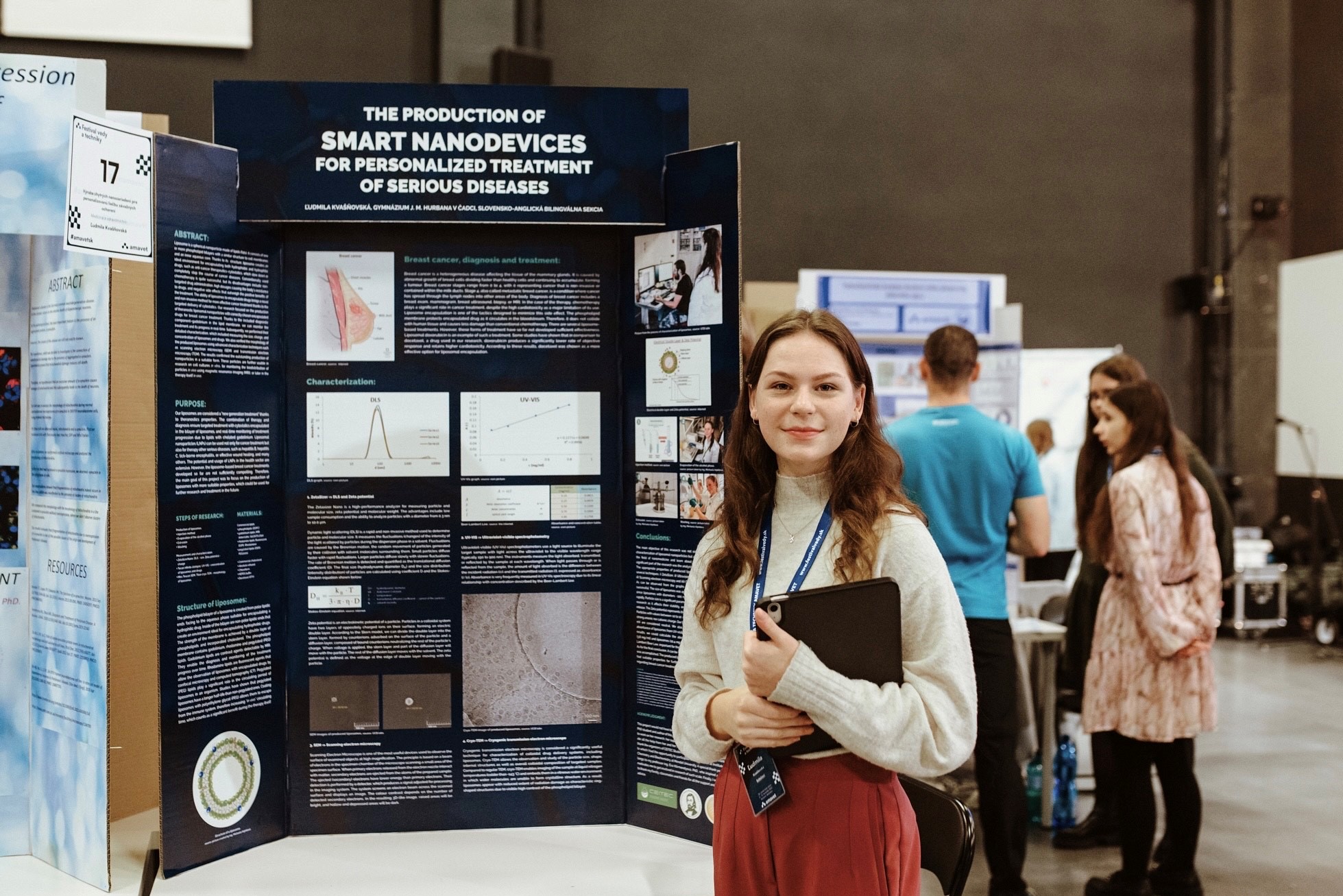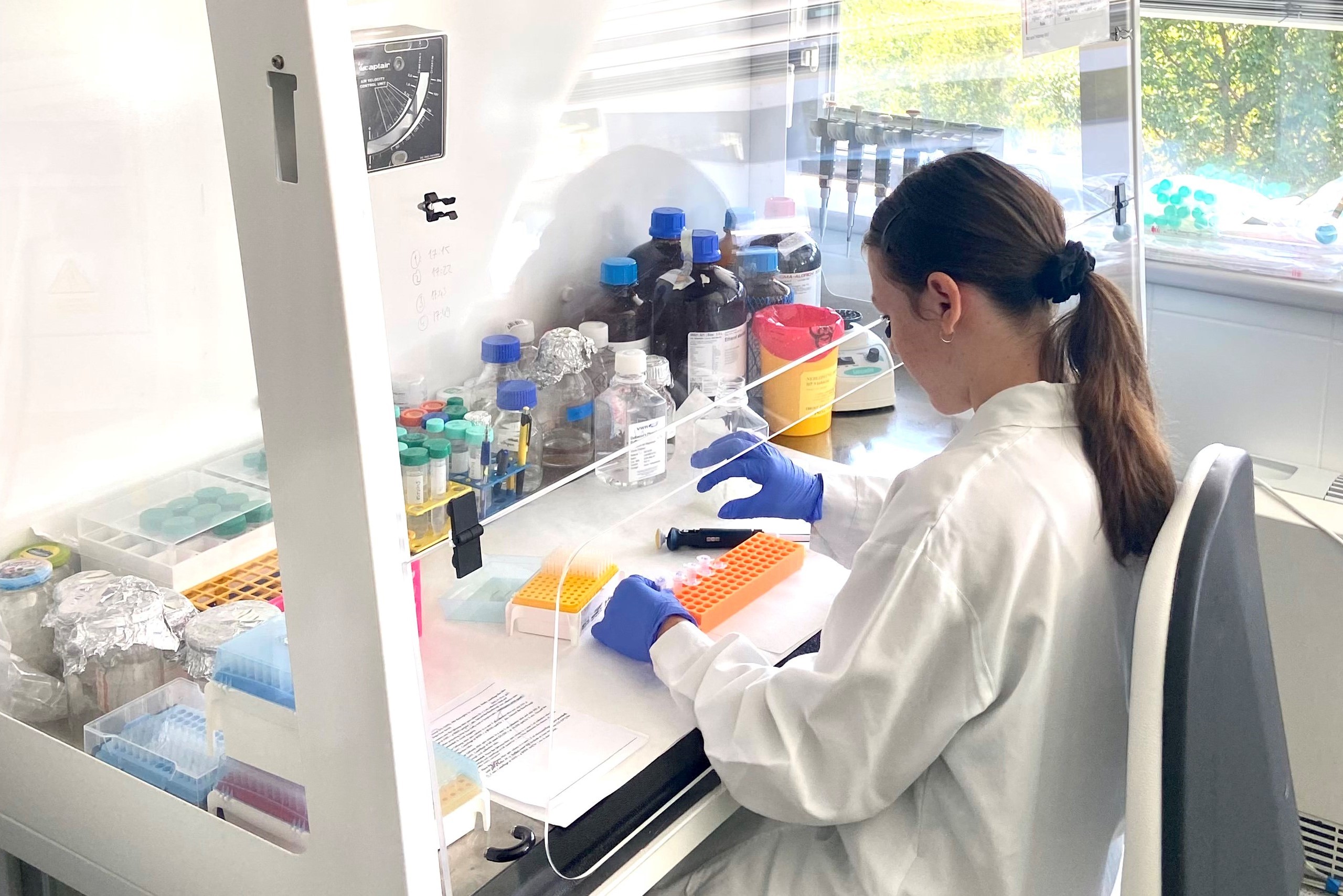The ICRC Academy has shaped my career
Ľudmila Kvašňovská is a 4th year student at the English Bilingual Grammar School in Čadca. In 2022, she went through the ICRC Academy weekend seminar, which started her journey into science. In this interview, she reveals how she made her way from her hometown of Staškov in northern Slovakia, through the ICRC Academy and an internship in one of our research teams, to the forefront of the Slovak Secondary School Vocational Activity (SOČ) competition.
Photo: Ľudmila Kvašňovská
How did you find out about the ICRC Academy?
A friend recommended the ICRC Academy seminar to me, which she herself had previously attended.
How do you rate your participation? What did it give you?
What I appreciated the most was the opportunity to intern at a top research center while still in high school. I gained a lot of experience from planning experiments to analyzing and interpreting results. Moreover, I worked in a great team and had an amazing mentor, Petra Lázničková, MSc., Ph.D. I would definitely recommend an internship at the ICRC to anyone with a passion for science and research.
What did you do in your research?
I was investigating potential biomarkers, i.e. measurable indicators, of chronic inflammation associated with aging. These included inflammatory cytokines, soluble CD163 protein and free mitochondrial DNA in human plasma. I was able to find that the soluble protein sCD163 could be used for early diagnosis of chronic inflammation in the elderly and thus prevent the development of various chronic diseases. This protein is present in blood plasma and is produced by immune cells when inflammation occurs in the body.
Photo: Ludmila at work in the lab
Why did you choose this particular area of research, what made you decide to do it?
I was already interested in the field of immunoregulation, which is the study of the properties and regulation of the immune system. I liked it so much that I was happy to accept the offer to join Dr. Frič’s Cellular and Molecular Immunoregulation team at the ICRC.
Was the internship time consuming?
The internship lasted 4 months from August to December 2022. In total, I spent more than 70 hours in the labs.
What are your future plans? Are you considering a scientific career?
It was through the ICRC Academy that I realised where I want to take my career. I will be applying to study medicine next year and I would very much like to pursue a scientific career alongside my studies and work. I have also participated in the Slovak SOČ with my research project that I carried out within the ICRC.
Please tell us more about the SOČ.
It is a competition in which high school students can create a professional paper on a chosen topic. They have a supervisor with whom they consult their results. They then have to defend their work publicly in the various rounds of the competition. I see this as a great opportunity to develop a project with an interesting topic that is really similar to the level of a bachelor’s or master’s thesis. I have always wanted to try working in a research centre and share my results further, and the ICRC Academy and the SOČ have made this possible.
How did you do in the SOČ?
My project made it to the national final, which took place on 26-28 April 2023. I competed for the Healthcare and Pharmacology category, where 16 projects from all over Slovakia advanced from the regional rounds, and the competition was really high. In addition to the presentation, there was also a debate with the expert evaluation committee, which I had no problem with thanks to the ICRC Academy, and I ended up winning. Unfortunately, my category will not continue from the national round, but I plan to compete with my project at the AMAVET Science and Technology Festival in the autumn, so my competition is definitely not over yet.
How do you spend your free time?
Apart from science, I am actively involved in The Duke of Edinburgh’s International Award (DofE for short). The aim of the programme is to promote the holistic development of young people’s abilities through long-term and regular activities in several areas: e.g. developing new skills, exercise or volunteering. Participants can receive an internationally recognised certificate – Bronze (minimum 6 months of performance), Silver (minimum 12 months of performance) and Gold (minimum 18 months of performance). My focus at the gold level is primarily on German language study. In the sports category, I am involved in gymnastics and acrobatics, and as part of my volunteer work I run gymnastics classes for children at a local dance club. I also like to exercise and I really enjoy studying languages and art.
Thank you for the interview and I wish you continued success in science and other activities!
Author: Marta Vrlová, M.A., MPH, Senior PR Specialist ICRC, marta.vrlova@fnusa.cz.
Media contact: Ing. Jiří Erlebach, Head of PR and Marketing Dpt, FNUSA Spokesperson, +420 543 182 006. jiri.erlebach@fnusa.cz.



